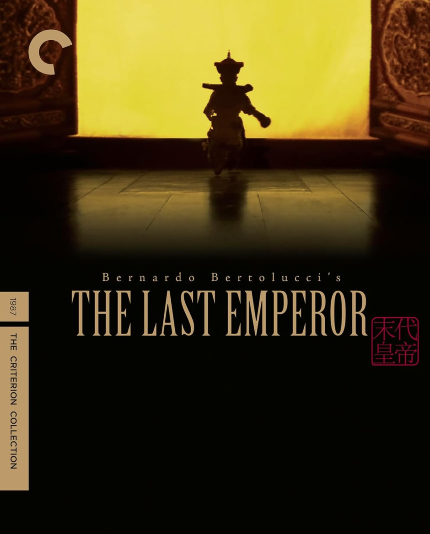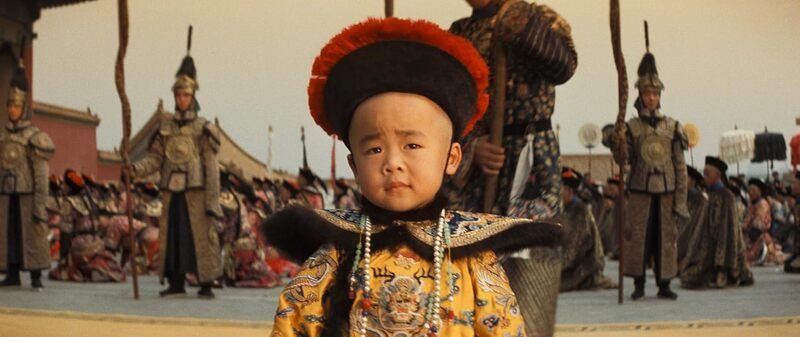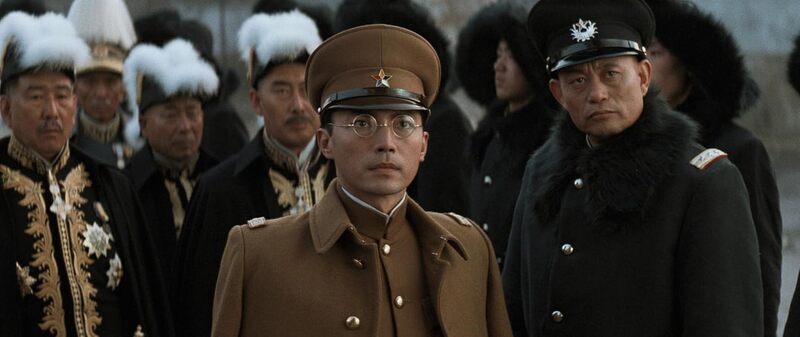THE LAST EMPEROR 4K Review: Sweeper of Oscars, Prisoner of History
Bernardo Bertolucci’s Best Picture winner arrives to Criterion 4K UHD.

When one thinks of Bernardo Bertolucci’s impossibly lavish multi-decade historical epic The Last Emperor, the term “prison movie” likely isn’t top of mind. Yet, that’s so much of what the film is.
At nearly three hours and bursting with ornate production value, 1987’s The Last Emperor hails from a time when Oscar-bait was Oscar-bait. At a glance, this sprawling historical biopic with a global scope might appear to be just that.
Among its cadre of fellow Best Picture nominees at 1988’s 60th Academy Awards, it certainly resonated largely as such. Notably, of those four films -- James L. Brooks’ Broadcast News, Norman Jewison’s Moonstruck, John Boorman’s Hope and Glory, and Adrian Lyne’s Fatal Attraction -- more are now part of the Criterion Collection than not. (Those others being the former two).
Yet, upon closer examination, something that this extras-packed Criterion edition utterly welcomes, The Last Emperor is divergent nearly to the point of chaos. Boasting an Italian director, a British producer (Jeremy Thomas), American and Japanese composers (David Byrne and Ryuichi Sakamoto, who also acts in the film), and numerous actors of Chinese descent (including Joan Chen, Ruocheng Ying, Victor Wong, Dennis Dun, Vivian Wu, Lisa Lu), it most definitely ranks as one of the most internationally diverse major film productions since 1980’s Flash Gordon. Unlike that glorious Tower of Babel writ to celluloid, however, The Last Emperor evidences a sure hand at the helm, even as it embraces a nonlinear structure quite uncommon at the time.
Essentially, one of the first things we see is the titular character, Puyi (played as an adult by John Lone) cut his wrists in a dismal train station men’s room. What brought the last traditional emperor of China to such a bloody low? That is the question that the film sets up.
The first film cleared to shoot inside China’s centuries-old, majestic Forbidden City, Bertolucci and his tireless crew make stunning use of the location. Per history, toddler Puyi is brought to the Forbidden City in 1908 to assume the mantle of Emperor of China.
Separated from his mother and everything he’d previously known, the child doesn’t take well to becoming sudden royalty. For years following, Puyi finds solace and sustenance on the breast of his wet nurse, Ar Mo (Jade Go)… that is, until she is sent away. It turns out that unbeknownst to the young emperor, things have radically changed outside the Forbidden City walls.
As a teenager and young man, it’s become quite clear to Puyi that he is being sequestered inside of the Forbidden City. Fed up with being condescended to, he belligerently tries to leave, and later fires his legion of eunuch servants.
All the while, he lives and learns under the appointed tutelage of one Reginald Johnston (a perfectly commanding Peter O’Toole), a proper Englishman whose decorum and lessons prepare Puyi for the remainder of his life out in the world. It turns out that not even an ingrained empirical system like China’s can withstand back-to-back revolutions and invasions.
For a spell, Puyi appears to do alright in public life, leading a life of polygamous affluence. Soon enough, however, isolation catches up to him. He finds himself a political prisoner of the Soviet army. As the bright and lively cinematography of Puyi’s childhood is fully replaced with a grey and muted aesthetic, he eventually makes his way to that train station men’s room to take his own life. But even this drastic action is outside of his agency. They can have it all, his empire of dirt.
John Lone does a formidable job portraying adult Puyi, rendering him as a compelling-enough presence, infused with broken soul and appropriately far from heroic. If character “likability” is a factor in one’s appreciation of any given film, one’s reaction to The Last Emperor remains anyone’s guess. Also, keep in mind that this is Bertolucci at the helm, maker of The Conformist and Last Tango in Paris. Lone’s Puyi is doing well just to survive; often, mere adaptation to whatever extreme situation his life then becomes is all the triumph he can muster.
Impressively, if also tedious for those of us tuned in live back in the day, The Last Emperor swept all nine categories for which it was nominated at that year’s Oscars, a rare and impressive feat, if also, in the moment for those of us tuned in live back in the day, an increasingly tedious one. Tellingly of a gross racial ignorance within the nominating body of the time, none of these nominations were in acting categories. The same remained true many years later of surprise Korean Oscar winner Parasite.
Criterion has released The Last Emperor several times previously. Longtime collectors may be leery to purchase it yet again, particularly when the extras are unchanged, as voluminous as they are, and the imposing packaging of the DVD release is absent. But notably, this release marks the first time that the film has been released within the Criterion Collection in its proper aspect ratio.
Previously, the company copped to the film’s cinematographer Vittorio Storaro’s edict, in accord with his absurdly limiting and headscratchingly revisionist Univisium format, that all of his previous widescreen work be cropped to his proposed “universal aspect ratio” of 2:1 to more fully fit the then-new 16:9 HD television screens. In his mind, 2:1 would be the new global aspect ratio going forward, prioritizing image detail over composition.
With the subsequent advent of 4K clarity in the home, this concern is now largely moot. To finally, finally be able to view and own The Last Emperor in its original 2.35:1 ratio- in stunning HDR clarity, no less- is the absolute greatest reason to go for this 4K UHD upgrade. The 16:9 cropped version does, however, live on. The theatrical version on the included Blu-ray disc remains the revisionist cropped Storaro version.
This release, being a revisitation of a what was one of Criterion’s biggest releases of the DVD era, is truly jam-packed with bonus features, the way these things used to be. So, so much content to wade through… In the proper interest of conserving as much of the 4K UHD’s disc space for the film itself, all the extras are found on the included Blu-ray disc of the theatrical version.
First and foremost among said content is an audio commentary featuring director Bernardo Bertolucci, producer Jeremy Thomas, screenwriter Mark Peploe, and composer-actor Ryuichi Sakamoto. It’s a cobbled-together affair, as each participant was obviously recorded separately. Although many years have passed since this track was created, even then they are initially struggling to recall the details that they are there to talk about. Thankfully, they quickly get up to speed, and there’s no shortage of discussion about how this grand film was made.
Running around one hour in length is Fernand Moszkowicz’s documentary, The Italian Traveler, Bernardo Bertolucci. In pure doc form, Moszkowicz explores the director’s geographic influences, from Parma to China. Most of the other vintage behind-the-scenes pieces included on this set are of similar form. This includes yet more footage taken by Bertolucci while on preproduction in China, and two more documentaries about the making of the film.
The creation of The Last Emperor was nothing if not well documented, and Criterion seems to have left nothing on the table. That being the case, none of these extras are new to this 4K UHD edition, so all have existed as a package for over fifteen years.
Perhaps the biggest extra of all is the 218-minute extended television cut of the movie. It’s a formidable extra, as it occupies its own Blu-ray disc, pushing this release’s disc count to three. But it should also be known that this version is not considered any of The Last Emperor’s creators preferred version of the film, including the late Bertolucci.
It’s great that Criterion hasn’t scraped away any of its previous extras, and that it’s 4K UHD release remains the definitive all-inclusive purchase for the title. The extended cut should, however, be viewed as nothing more than a super-sized extra.
In an included 2007 video interview, pop star David Byrne, one of several composers to contribute original music to the film, recalls his working experience. The biggest revelation he discloses about the unconventional score is that his contributions and the contributions of co-composer Ryuichi Sakamoto were often assumed to be the other guy’s work. Byrne talks about how, despite his best efforts, ended up leaning into sounds he derived from his own research of all manner of Chinese music. Cultural appropriation was never a goal, and in fact was something that all parties involved strived to avoid. It’s safe to say that what Byrne contributed, he contributed with highest respect.
Unlike the reign of Puyi himself, Criterion’s The Last Emperor refuses to be dethroned as one of physical media’s grandest packages. While the racial dynamic of the cast and crew of this completely Chinese story wouldn’t pass muster in today’s strict representational environment, it’s probably pointless (and certainly futile) to point such fingers at this film.
Only slightly less pointless is taking The Last Emperor to task for supposedly softening Puyi’s behaviors while in charge. No one should look to historically based movies as historically accurate. Still though, this film has plenty of history unto itself, which Criterion has wrangled. One might say, it is a treasure trove suitable for an emperor... even a perpetually imprisoned one.
Criterion’s official list of features:
• 4K digital restoration, presented in the aspect ratio of 2.35:1, with 2.0 surround DTS-HD Master Audio soundtrack
• One 4K UHD disc of the film presented in Dolby Vision HDR and two Blu-rays with the film and special features
• Audio commentary featuring director Bernardo Bertolucci, producer Jeremy Thomas, screenwriter Mark Peploe, and composer-actor Ryuichi Sakamoto
• 218-minute television version
• The Italian Traveler, Bernardo Bertolucci, a film by Fernand Moszkowicz tracing the director’s geographic influences, from Parma to China
• Footage taken by Bertolucci while on preproduction in China
• Two documentaries about the making of the film
• Program featuring cinematographer Vittorio Storaro, editor Gabriella Cristiani, costume designer James Acheson, and art director Gianni Silvestri
• Archival interview with Bertolucci
• Interviews with composer David Byrne and cultural historian Ian Buruma
• Trailer
• English subtitles for the deaf and hard of hearing
• PLUS: An essay by film critic David Thomson, a reminiscence by Bertolucci, interviews with production designer Ferdinando Scarfiotti and actor Ying Ruocheng, and an essay by Fabien S. Gerard Cover by Lucien S. Y. Yang
The Last Emperor
Director(s)
- Bernardo Bertolucci
Writer(s)
- Enzo Ungari
- Mark Peploe
- Bernardo Bertolucci
Cast
- John Lone
- Joan Chen
- Peter O'Toole









